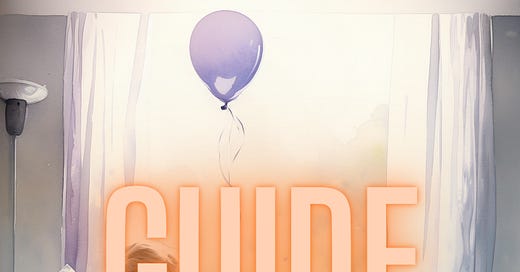For each short story we have created a guide that elaborates on the subject/conflict of the story and offers some more insights about the topic. The guide also offers a quick exercise that helps the reader examine their relationship with the subject and see themselves more clearly.
We recommend reading the short story first, you can find it here:
"The Balloon," a short story about the last hours and peaceful passing of an elderly woman, strikes many as sad. However, for me, it describes a miracle. It narrates the end of an old woman’s life who harbors no resentment, doesn't complain, isn't afraid, and isn't angry. A person who has managed to make peace by the end of her life with themselves, her fate, and the world. I believe this is the greatest gift we can receive from life or give to ourselves.
I wrote this short story about one of my grandmother's sisters, whom we visited in her final days at the nursing home. The peace and tranquility emanating from her were astonishing. I had never felt such a thing from anyone preparing to face death. There was no fear in her eyes, only calmness, and of course, fatigue. At almost ninety-nine, she had grown weary of life's roller coaster. Like most people who experienced two world wars in Europe, dictatorship, economic crises, her life was quite adventurous, despite spending part of it as a nun. In her older years, she traveled a lot with her friend, making up for lost time and opportunities during the tough decades. And yes, she was the one who held those tea parties and spent hours showing slide shows of her travel photos, which I wrote about in “The Wizardry of Life’s Veterans” and found so tedious as a child. Today, I would give anything to sit again with my grandmother and her sisters among those ancient pieces of furniture, watching the seventieth slide of St. Mark's Square.
After my grandmother's sister passed away, I often pondered what her secret was. Like I said above, I had never seen an old person depart so peacefully. Of course, she had no family besides us, her siblings' children and grandchildren, no one she was too afraid to leave behind, but still. Could it have been her deep religiosity? Her belief in resurrection soon? That her life started under such difficult circumstances, which haunted her well into adulthood? Maybe considering what she had gone through, the travels in her later years, the relatively peaceful job, and the less oppressive living conditions after the dictatorship seemed like miracles to her. To this day, I don't know, and I regret never asking. But at least I saw and felt that energy of calmness radiating from her. I can only hope that when my time comes, I will cross into the other dimension with such peace.
That's precisely why “The Balloon” is so important. By reading it, we receive an energetic imprint, the imprint of what it feels like to surrender to the inevitable demise in peace, reconciled. Getting to know and remembering this energetic imprint from time to time helps us set our goal for a peaceful death and adhere to it by motivating us to live a fulfilled life. This is, in my opinion, why reading good stories is so crucial. They allow us to feel and transmute emotions without forcing us to live through those experiences in our real lives. This means we can learn from the energetic imprints of those situations and feelings we read about, deciding what we want to experience for real and what we do not. While the topic of death might scare or even horrify some, in my opinion, it's worth engaging with.
To arrive at death's door able to accept this next chapter of our lives, whatever it may bring, we indeed need to reach a point of reconciliation with our actions, settle our affairs with loved ones, and experience those things we want to experience.
Naturally, I am aware that death can come in many forms, whether old or young, ill or healthy, and sometimes we neither have the time nor the opportunity to settle everything or make peace with everything. Still, I believe we can do things in our everyday lives to ensure we depart as peacefully as my grandmother's sister did.
By periodically asking ourselves the following questions, and if necessary, changing our lives based on our answers, we can improve our chances of departing in peace when the time comes:
What are the things I definitely want to experience, taste, see, own, or read?
Who are the people I miss in my life, either because we had a conflict or simply because we drifted apart? If there was a conflict, what steps could I take to mend it? If we just drifted apart, how could I reinitiate contact?
What are the things I still want to learn?
What are the achievements I want to attain?
What are the things I'm saving for better days and thus not using?
Who am I upset with? Angry at? Who causes me pain? Who am I mad at? Do these feelings still make sense, or have they lost their significance and now only their echo resonates within my soul?
What could I do to let go of my negative feelings towards others? This question, based on my experiences, is very important, and it's also crucial not to dismiss it with an answer like 'I'm over it,' but to honestly and bravely examine ourselves.
What are the things I'm ashamed of? What should I have handled differently? Do I owe anyone an apology? Have I taken responsibility for my actions?
Do I regularly show my loved ones how important they are to me? Do I understand their love language and communicate with them through it?
Have I made provisions for my loved ones in case of my death?
What are my accomplishments, traits, and actions that I am proud of?
What have been my dearest experiences so far, and how can I gather more of them?
Am I afraid of death? Or am I more afraid of suffering, of illness?
What are my thoughts on death? What do I believe will happen to me?
Am I okay with what will happen? If not, what am I afraid of? Being forgotten? Being closed in a coffin? Punishment? Causing pain to my loved ones? Or maybe something else?
Often, fears lose their power when we voice them, even if just to ourselves, aloud. If we can precisely articulate what we're actually afraid of, then we can either do something about it to alleviate our feelings, or by facing the specific fear, give ourselves time and the opportunity to come to terms with it.
I believe that answering the above questions can help us prepare for death more peacefully and calmly. If we've done our homework, then we can devote our full attention to living our lives to the fullest, as there will be no unresolved issues, unprocessed emotions, or unsolved tasks lurking in the back of our minds.
– Eszter
Related
The Wizardry of Life's Veterans
Love Languages
Home | Notes | Articles | Eszter’s Magic | Literary Bonbons | Short Stories and Guides | Beyond the Book | EWE Issues | Archive | About







